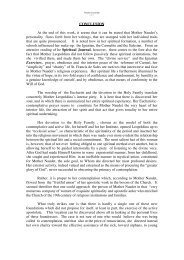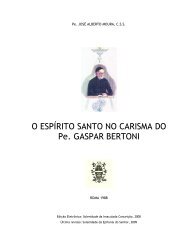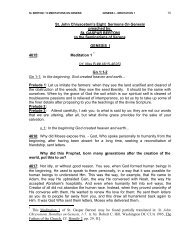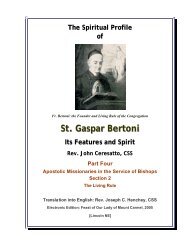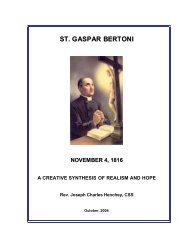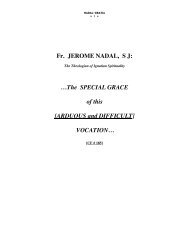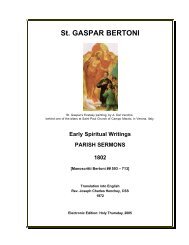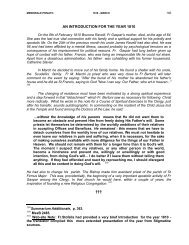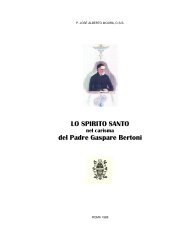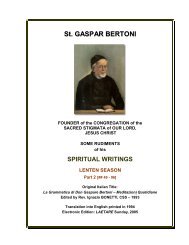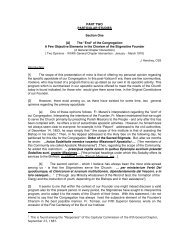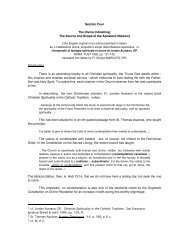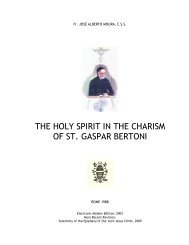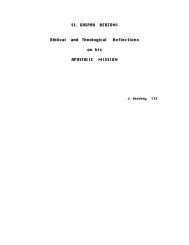[B.] St. IGNATIUS of LOYOLA Presentation: The ... - St. Gaspar Bertoni
[B.] St. IGNATIUS of LOYOLA Presentation: The ... - St. Gaspar Bertoni
[B.] St. IGNATIUS of LOYOLA Presentation: The ... - St. Gaspar Bertoni
Create successful ePaper yourself
Turn your PDF publications into a flip-book with our unique Google optimized e-Paper software.
INTEGRE;SJ-OFM<br />
= 40 =<br />
imposed on the Saint that <strong>of</strong> authorizing as head <strong>of</strong> his new Community, one <strong>of</strong> the most<br />
seditious and turbulent rebels against him. <strong>The</strong>se are indications <strong>of</strong> the secret, adorable<br />
dispositions <strong>of</strong> God, employed to try His servants.<br />
1858: <strong>The</strong> temptation <strong>of</strong> the devil is the second type <strong>of</strong> Cross, and this was quite fierce and<br />
long-lasting. This came to him under every guise, both from within, and from the outside.<br />
<strong>The</strong> Cross in third place, and the heaviest <strong>of</strong> Crosses, was the most severe<br />
mortification that he personally imposed on himself: very meager meals, from which he was<br />
scarcely able to conduct his life, and these were rendered tasteless by the sprinkling <strong>of</strong> ashes, or<br />
cold water on the cooked vegetables. He only made use <strong>of</strong> these cooked vegetables in times <strong>of</strong><br />
illness, and solely in its most acute phases. His sleep was very short, and always on the floor,<br />
with a stone, or block <strong>of</strong> wood under his cheek, even after having been worn out in preaching.<br />
Otherwise, he would take his rest as though in passing, even standing up, or seated. His flesh<br />
was afflicted with rough clothing, that was purposefully rendered so. Such clothing allowed him to<br />
suffer from the heat, and also the cold, undergoing the greatest discomfort from the seasons as<br />
they passed. He tormented his own flesh with hair-shirts, caused it great discomfort by prolonged<br />
fasts, lacerated it with assiduous flagellation, even though he was almost habitually infirm, and<br />
languishing in his illness<br />
1859: <strong>St</strong>ill not satisfied in carrying such a cross, and one that was so heavy, he took it along<br />
with him to live among barbarians, in order to seek there something even more harsh and<br />
contrary to his nature, if something could be found to assist him to rise up. However, not finding<br />
even this, he did find another commitment to raise up there on his own, in his very love towards<br />
Christ. Since his love gave him great desires to be with Christ [Having a desire to be dissolved<br />
and to be with Christ, Ph1:23], he discovered a great cross in the sheer living in the world<br />
and that life itself was a very harsh martyrdom. <strong>The</strong> world is crucified to me, and I to the<br />
world Ga 6:14. Here he is on his Cross: but love knows no limits.<br />
1860: It was not enough for Francis to be patient on his Cross, while he was still alive: he<br />
indeed wished to be crucified, and even further, to be dead. For I …am dead Ga 2:19. Love<br />
assisted him even in this: For love is strong as death Ct 8:6. In the end, he was indeed totally<br />
dead: dead to the life <strong>of</strong> sensation, dead to the world. A dead person does not see, not hear, nor<br />
taste, nor does he have feeling, or movement, he does not speak: he does not change, nor<br />
experience resentment, nor is such a one moved. This describes Francis with regard to this world<br />
from which he was totally outside it. His world was entirely interior to himself: the three-fold<br />
concupiscence, explained by <strong>St</strong>. John, 1 Jn 2:16, and to all else, he wished to be dead.<br />
1861: Regarding the concupiscence <strong>of</strong> the flesh: so that it would die, he would role about in the<br />
ice and the snowy bushes. For the concupiscence <strong>of</strong> the eyes, which is avarice: never dwelling in<br />
the ins, and not the proper clothing to remove the cold, or his nudity, hardly a piece <strong>of</strong> bread to<br />
satiate his hunger: in summary, he had nothing <strong>of</strong> his own, but the yearning for death. For the<br />
pride <strong>of</strong> life: whether he joined the people gathered in the square <strong>of</strong> Assisi, or entered into the<br />
major church <strong>of</strong> the town, he would be almost nude, other than his leggings, and a cord around<br />
his neck, he would let himself be drawn before the people in the public square as in accord with<br />
the customs <strong>of</strong> the time, malefactors would be conducted. <strong>St</strong>anding up on a stone, even when<br />
suffering fever and the very great cold, and seemingly close to death, he would nonetheless,<br />
preach to that people with great fervor and vigor <strong>of</strong> soul and would say to be heard by all: ‘I am<br />
not worthy to be honored as a spiritual man; rather I should be considered as one who is carnal<br />
and gluttonous and should be rejected by all the people, in that in the most acute phases <strong>of</strong> my<br />
struggles, I did make use <strong>of</strong> some meat. In his preaching, he would shout so that he would be<br />
heard by all: may it die, may all my pride be put to death: For I … am dead Ga 2:19.


![[B.] St. IGNATIUS of LOYOLA Presentation: The ... - St. Gaspar Bertoni](https://img.yumpu.com/33393889/40/500x640/b-st-ignatius-of-loyola-presentation-the-st-gaspar-bertoni.jpg)
